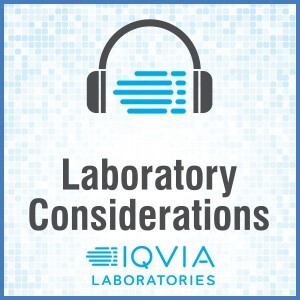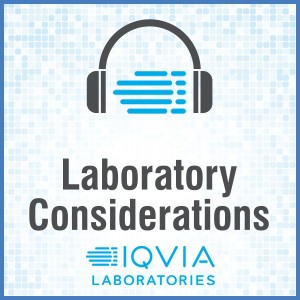Episodes

Wednesday Jul 28, 2021
Consent Tracking for Clinical Samples
Wednesday Jul 28, 2021
Wednesday Jul 28, 2021
She describes:
- How consent is or has been documented
- The benefits of electronic consent documentation
- Specific consent attributes, e.g. genetic testing
- Handling consent requirements from different countries or institutions
- Understanding consent for future use, including limitations and expirations
Learn more at https://www.q2labsolutions.com/labmatrix

Wednesday Jul 28, 2021
Tracking Clinical Trial Samples
Wednesday Jul 28, 2021
Wednesday Jul 28, 2021
She describes:
- The varying approaches of small vs. large laboratories
- Risks of insufficient tracking
- Tracking consent for future use
- Current practice and opportunities for improved tracking
Learn more at https://www.q2labsolutions.com/labmatrix

Tuesday Feb 02, 2021
Avoiding Canceled Tests in Pediatric Samples
Tuesday Feb 02, 2021
Tuesday Feb 02, 2021
In this episode, Charlie Fix, Global Director of Scientific Harmonization for Q Squared Solutions describes the challenges of safety testing for drugs in pediatric patients where sample volumes may be limited.
Clinical analyzers are set up to maximize throughput and minimize turnaround time. When a panel of multiple tests is ordered and a sample doesn't have a sufficient volume of blood to run all the tests in the panel, the test is canceled, resulting in no data for the sponsor and unnecessary stress for young patients and their families.
Q Squared Solutions has developed a protocol prioritizing a subset of tests for short samples. The decision to run the alternate panel is made by licensed medical technologists. Combined with specific sample collection kits for pediatric patients, this protocol minimizes the number of canceled tests.

Tuesday Sep 15, 2020
Covid Vaccine Testing
Tuesday Sep 15, 2020
Tuesday Sep 15, 2020
In this episode, Dr. Robert Bailer, Senior Director for Vaccines at Q2 Solutions, describes the processes for testing vaccines against the novel coronavirus, SARS-CoV-2. He covers both ELISA and virus neutralization assays.
Q2 Solutions has developed an ELISA assay to evaluate multiple different antigens at the same time. Looking primarily at the spike protein, it is dissected into different parts: S1, S2, S1 plus S2, and the receptor binding domain. The nucleocapsid protein is being evaluated as well.
We are taking a 2 pronged approach to the viral neutralization assays, working in collaborations with academic institutions to deliver a cutting edge approach.
The first, in collaboration with the laboratory Dr. Pei-Yong Shi at the University of Texas Medical Branch in Galveston, involves viral-like particles (VLPs) where the structural genes of wild type SARS-CoV-2 virus are removed and replaced with a reporter gene. In this particular case, it's a GFP or green fluorescent protein gene along with a neomycin resistance gene.
The second approach is a SARS Co-V 2 surrogate neutralization assay used under a license agreement with the Albert Einstein College of Medicine. This is the vesicular stomatitis pseudovirion process, commonly used for viral neutralization assays. It’s a different way of expressing an artificial virus. It involves taking the vesicular stomatitis virus genome, replacing some of the genes for VSV by inserting the SARS-CoV-2 spike genes, plus a reporter gene. Expressing that produces a virus-like particle or a pseudovirion that can be utilized. This approach has been used over the years in a wide variety of different applications at Q2 Solutions for example in Ebola.
The vaccine operation at Q2 Solutions has the infrastructure, the capabilities and support to have a three shift operation. We anticipate doing this 24/7, which is exactly what’s needed in the context of a pandemic. Further, our center for vaccine excellence located in Beijing, China will evaluate clinical trial samples coming to us there with the same repertoire of assays that are available in San Juan Capistrano, California. The Q2 Solutions model is that we provide answers globally and with high throughput.
Learn more at Q2labsolutions.com.

Wednesday Jul 29, 2020
Hybrid Assays for Protein Bioanalysis
Wednesday Jul 29, 2020
Wednesday Jul 29, 2020
In this episode, Drs. Steven Lowes and Barry Jones discuss hybrid assays, combining immuno-affinity with liquid chromatography-mass spectrometry (LC-MS). This is a growing area of opportunity for protein bioanalysis.
Topics covered include:
- What is meant by hybrid assay
- Reasons to choose a hybrid assay
- Top down vs bottom up
- Specific challenges
- Assay design considerations
- Future potential for this type of bioanalysis
...I think that fundamental point about more sensitivity, and associated with that is more selectivity, is going to be part of the future adoption of these hybrid assays. We have needs already, we can see needs for looking at quantifying proteins in very small samples, say tissue biopsies. - Steven Lowes
Learn more at Q2labsolutions.com.
Protein Biomarker Quantification by Immunoaffinity Liquid Chromatography–Tandem Mass Spectrometry: Current State and Future Vision (Article in Clinical Chemistry)

Wednesday Jul 29, 2020
High Throughput ADME Testing
Wednesday Jul 29, 2020
Wednesday Jul 29, 2020
ADME testing (Absorption, Distribution, Metabolism and Excretion) is an essential part of early stage drug development. In this episode, Dr. Matt Hutzler, Director of ADME Services at Q2 Solutions, describes the common paradigm of ADME testing and why short turnaround times are important.
Because speed is so important, outsourcing testing overseas may not make as much economic sense as it might have in the past, given shipping costs and the possibilities for delays (at customs for example.)
Dr. Hutzler explains the factors that contribute to the success of high-throughput ADME testing and what advances and innovations we might expect in the future.

Wednesday Jul 29, 2020
Liquid Biopsy Collection in Clinical Development Programs
Wednesday Jul 29, 2020
Wednesday Jul 29, 2020
A liquid biopsy is a minimally invasive alternative to a more traditional surgical solid tumor biopsy.
In this episode, Dr. Stephanie Hastings, genomics product lead at Q Squared Solutions, lays out the considerations for liquid biopsy collection and the type of information that can be gathered from circulating free DNA (cfDNA).
The main approaches comprise for evaluating cfDNA are:
- specific mutation detection to help support targeted therapies
- broader sequencing technologies to enable biomarker evaluations
- custom sequencing panels to support clinical trial assay development
She describes the typical panels for each of the approaches, the sample collection requirements and how these analyses are implemented on a global scale.

Friday Oct 25, 2019
An Next Generation Sequencing Approach to Influenza Vaccine Development
Friday Oct 25, 2019
Friday Oct 25, 2019
In this episode, Dr. Wayne Hogrefe and Dr. Pat Hurban discuss the use of NGS in the development and assessment of new vaccines against the influenza virus.
Topics covered include:
- What health organizations are looking for that drives the selection of the next season's vaccine strains
- How sequence data is used to evaluate the effectiveness of a vaccine while providing insight into the evolution of the virus
- How the sequence data can inform the development of new types of vaccines and therapeutics
- The prospects for a vaccine that is effective across multiple strains and multiple seasons
- How NGS data differs from traditional Sanger sequencing data and what can be learned from that
You can learn more about this topic at www.q2labsolutions.com

Friday Oct 25, 2019
Friday Oct 25, 2019
In this episode, Victor Weigman, Director of Translational Genomics at Q Squared Solutions and Mark Stewart, Vice President of Science Policy at Friends of Cancer Research (FOCR) joined to talk about standardization of TMB measurements by alignment to reference standards.
TMB differs from other biomarkers such as PDL1 in that:
"...we're leveraging next generation sequencing to generate a composite score from tens of thousands or in some cases millions of bases of sequence. So really you're summarizing this collection of mutations in a singular value versus a more qualitative range of expression levels done by looking at proteins in a microscope. - Victor Weigman
One challenge is that as treatments are being developed, the thresholds for the diagnostics are out of sync. Friends of Cancer Research understands the difficulty of harmonizing assays to a standard after FDA approval. For that reason, there is strong interest in harmonizing the results of different assays to a standard reference set.

Tuesday Mar 05, 2019
Monitoring the Tumor Micro-environment with Flow Cytometry - Mark Edinger
Tuesday Mar 05, 2019
Tuesday Mar 05, 2019
Mark Edinger is the Scientific Advisor for Flow Cytometry at Q2 Solutions. In this episode, he describes recent advances in flow cytometry and what that means for immuno-oncology trials.
New instruments, reagents and software are enabling researchers to monitor 30-some markers simultaneously to get a better picture of the tumor micro-environment and the interactions taking place.
For example, there's a whole list of new checkpoint inhibitors, like PD-1, CTLA-4, CD-1-52 and a multitude of other CD-47 that have been described, and their ligands on T cells and immune cells, not just T cells, that allows the tumor to actively turn off the host response to the tumor that prevent the tumor from being killed by the immune system. We weren't aware of these, many of these, until we had the tools that allow us to look at many more markers simultaneously. For instance markers of T cell activation have been around for a long time, but that list has expanded remarkably now, and the lists of markers of T cell exhaustion have really expanded as well, and some of those were not discovered until relatively recently, in the last 5 or 6 years.
Mark explained how flow cytometry is being used to determine whether a therapeutic is efficacious or not and the benefits that flow to the patient.
He stressed, as others in this series have, the importance of early engagement between sponsors and their clinical trials partners. Regular phone calls and direct conversations between scientists help refine the assays to produce the desired result in terms of the information collected from a panel.

